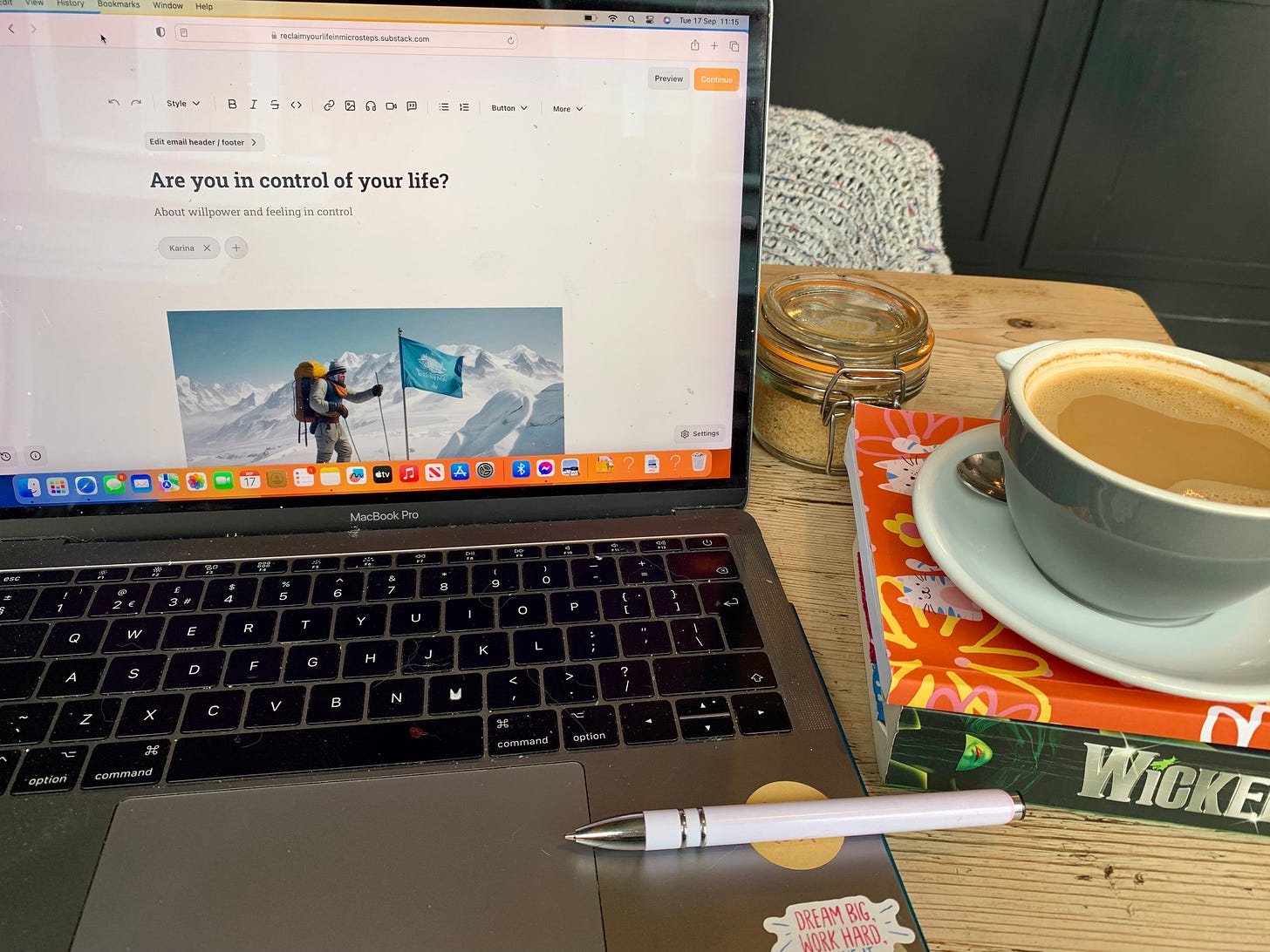Finding Your Strength: How Women Can Take Charge of Their Lives Post-Trauma, one micro-step at a time
About willpower and feeling in control
Let me start with a question: Are you in control of your life? It’s a deceptively simple question, and responses can vary widely:
- "Yes, I am because I’m making my own choices."
- "Being in control is an illusion; nobody is truly in control."
- "I wish I were, but I’m so lost, entangled, and tired that I’m definitely not."
We each respond from our own reality, shaped by the experiences and perspectives we’ve accumulated up to this moment. It’s a reflection of our personal narrative.
Now, let’s delve into willpower. Are you in control of your willpower? Well before doing this, let me tell you a personal story.
This Tuesday morning, bathed in the gentle warmth of an Indian Summer, I decided to give myself a dose of self-care and reflection. I asked myself, "What do I need to do today to support my emotional well-being and inner strength?" The answer was clear: I needed to go by the sea, take a walk, enjoy a cup of coffee in a new spot, and write about something I’m passionate about.
So here I am, in the heart of Eastbourne, nestled in a vibrant new coffee shop called Hyde Corner. It’s the perfect setting for this moment of introspection. The ambiance is inviting and invigorating: wooden tables add a rustic charm, the friendly atmosphere wraps around you like a warm hug, and the modern yet cozy design makes you feel right at home. Latin American music softly fills the background, its rhythmic beats and melodious tunes blending seamlessly with the scent of freshly brewed coffee. The music creates a lively, yet soothing backdrop, enhancing the overall experience of this cozy haven.
As I sip on a perfectly brewed cup of coffee (you might know dear reader that I am pretty fussy with my coffee), I find myself contemplating the challenges we face when trying to harness control over our lives. One day, we start new habits with unwavering resolve. We’re motivated and focused, with everything seeming to go smoothly. Yet, when life throws us unexpected challenges, it can feel like we’re adrift on a stormy sea, struggling to maintain our course.
Our willpower, once strong, can be tested by stress and unforeseen events. We might find ourselves tempted to revert to old comforts:
🦋 A glass of wine too much to unwind
🦋 Those jelly baby sweets that offer a fleeting escape
🦋 Eating late at night instead of heading to bed
🦋 Adding sugar - again after months of drinking it without - to our coffee for a quick fix
Suddenly, all the progress made over weeks feels precariously close to unraveling.
Reclaiming control, especially during such times, is both essential and achievable. With over 20 years of experience guiding others through their personal struggles, I’ve found that empowerment starts with practical, actionable steps. Here’s a roadmap to help you regain a sense of control:
Step 1: Identify Your Sphere of Influence
To regain control, start by clarifying what you can actually influence. Make a list of areas in your life where you have power or choice. This could be your reactions to stress, setting personal boundaries, or making daily decisions. By focusing on these areas, you direct your energy where it’s most effective.
Action Tip: Create a “Control Chart” dividing it into three sections:
Things I Can Control
Things I Can Influence
Things I Cannot Control.
Focus on the first two sections, and practice letting go of the third.
Step 2: Set Small, Achievable Goals
Facing challenges can be overwhelming, so breaking down your goals into small, manageable micro-steps can make them seem more attainable. Set goals that are specific, measurable, and realistic, and tackle them one micro-step at a time.
Action Tip: Start with a small, manageable goal related to a personal challenge. For example, if stress is an issue, your goal might be to practice deep breathing for five minutes each day. Start with small, achievable, micro-steps.
Step 3: Cultivate a Supportive Network
No one should face tough times alone. If you are an expat you are facing this challenge on a daily basis so be gentle with yourself and connect with like minded people. Build a supportive network of friends, family, or mentors who can offer encouragement, perspective, and practical help. Surround yourself with those who uplift you and seek their support when needed.
Action Tip: Reach out to someone you trust and share your goals or challenges with them. Regularly update them on your progress and seek their support.
Step 4: Practice Self-Compassion
It’s common to be our own harshest critics during difficult times. Practicing self-compassion involves treating yourself with the same kindness and understanding you would offer a friend. Recognize that setbacks are part of the journey and be gentle with yourself.
For those recovering from trauma or enduring the lingering effects of abuse, practicing self-compassion can be particularly challenging. Years of harsh self-judgment and internalized blame often accompany such experiences, making it difficult to offer oneself the same empathy and kindness that one might extend to others. It’s important to understand that healing from trauma involves acknowledging and addressing these deep-seated patterns of self-criticism. It may require consciously reframing self-talk, challenging ingrained beliefs about worthiness. Rebuilding a compassionate relationship with yourself is a gradual process, but it's crucial for fostering resilience and promoting overall well-being. Remember, self-compassion isn’t a sign of weakness but a vital step towards reclaiming your strength and fostering a healthier self-image.
Action Tip: Begin a self-compassion practice by writing down positive affirmations or comforting messages to tell yourself when you feel down. Read these affirmations daily or whenever needed.
Step 5: Embrace Flexibility and Adaptation
Life is unpredictable, and rigid plans can lead to frustration. Embrace flexibility by being open to adjusting your plans as circumstances change. Adaptation allows you to respond more effectively to new challenges and maintain a sense of control.
Action Tip: When faced with unexpected changes, assess how you can adapt your plans. Write down one or two alternative strategies and choose the one that aligns best with your current situation.
Last but not least please remember that reclaiming your life is a journey of focusing on what you can influence and taking deliberate steps toward empowerment. By identifying your sphere of influence, setting achievable goals, building a supportive network, practicing self-compassion, and embracing flexibility, you can regain a sense of control even amidst uncertainty.
As I sit here in this charming coffee shop, savoring the blend of Latin American music and the rich aroma of coffee, I’m reminded that control isn’t just an ideal but a practical reality we can all embrace. Take it one step at a time, and you’ll find that you have the power to steer your life in a direction that aligns with your values and aspirations.
Until next time, be well.
INSPIRATION CORNER
Drawing, painting, doodling is good for the soul - one page from the We are many people creativity workbook












